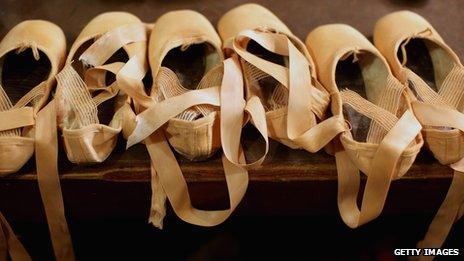Artful (tax) dodgers?
- Published
- comments

Your business is booming. You are rich. You're beginning to feel uncomfortably well off: it's time to share your good fortune. You love the arts and decide to give £1m to the Royal Ballet: a fine institution and a charity to boot.
This is money you have yet to pay tax on. As a high-earner, you pay at a rate of 50%, which means a £1m gift costs you personally about £500,000 - the other half is taken from your tax bill.
With the current tax relief system, a £1m donation breaks down like this:
you give Royal Ballet £800,000
and pay £200,000 tax
ballet company can claim that £200,000 back from the Treasury under the Gift Aid scheme, external
Of course, you - as intended - are left with nothing. But then so is the Treasury.
Replay the scene, but with the changes to the charitable tax relief system as proposed by the chancellor in his recent Budget. Of your £1million gift:
Royal Ballet would receive a little over £600,000
Treasury picks up the rest
Your donation has still personally cost you about £500,000, but the net result is your generous donation is worth a great deal less to the Royal Ballet.
This scenario, unsurprisingly, has upset many state-funded arts institutions. They feel as if they have been let down by the government.
Culture Secretary Jeremy Hunt announced significant cuts to government funding of the arts last year. But he cushioned the blow by saying that both he and the government would do their utmost to encourage more philanthropic giving. In 2011 Mr Hunt launched a Year of Corporate Philanthropy.
It was a well-intentioned initiative. But, by his own admission, the venture was not a success. Corporate giving did not rise during this period; it fell. The arts sector winced. Still, there was always individual giving - private philanthropy - and the culture secretary said he was very keen to support that.
Then last month came the chancellor's budget announcement.
Nobody in the arts that I've spoken to thinks the new tax proposals will have anything but a detrimental effect on philanthropy. Not just in terms of money, but also by discouraging people to give.
George Osborne explained at the time that the changes were to stop the rich offsetting their tax bill by giving to "dodgy" charities. Ministers say they want to end the practice of wealthy people minimising their tax bill - sometimes to zero - by donating to charity. The upshot of these comments, one senior fundraiser told me, was that "the government has changed the perception of philanthropists from generous do-gooders, to greedy tax-evaders".
The government has since announced a formal consultation over plans to limit the tax relief on charitable donations, saying there are "various options on table". And Number 10 has said David Cameron wants to see more charitable giving.
Consequences of the proposed change are worthy of consideration. Let us accept - for the sake of argument - that it is desirable for our arts institutions to operate at their current level in terms of programme and cost. Let us also accept that the amount of money philanthropists have available to give away remains unchanged.

Hit plays such as One Man, Two Guvnors and War Horse started out at the National Theatre
Under these circumstances, the new tax system would leave a deficit in the funding of our arts institutions that would probably fall to the government to cover.
The effect of which would be that the tax-paying population as a whole would be paying more to fund the arts, and the super-rich less. Is that fair? After all, large swathes of the British public don't actually go to the ballet, or the theatre or an art gallery, but wealthy arts enthusiasts do so a great deal.
In the United States, a country Mr Hunt has cited as an exemplar for encouraging philanthropic behaviour, there are generous tax concessions to stimulate individual giving, meaning the rich pay more to play - and the poor less to watch them have fun.
The alternative is to accept that arts institutions will have a reduced income. But that is not without risk, given that the vast majority of philanthropic giving is allocated to the UK's major institutions such as the National Theatre, British Museum and the Tate Gallery.
Over the past decade or so, they have all thrived through investment to become an important part of the country's domestic economy and international reputation. For example, both the British Museum and the Tate are in the top five tourist attractions, external, while the National Theatre has successful shows running in the West End and on Broadway. All of this activity generates commercial income on which tax is paid.
It is often the additional money given by philanthropists that allows these institutions to take a risk, to put on a show or to add a new facility. It is therefore quite possible that a less well-funded arts sector could end up costing the Treasury and the taxpayer a great deal more money than the small amount of extra revenue generated by changing the rules on charitable giving.
Jeremy Hunt's office would not comment, saying tax is a "Treasury matter".